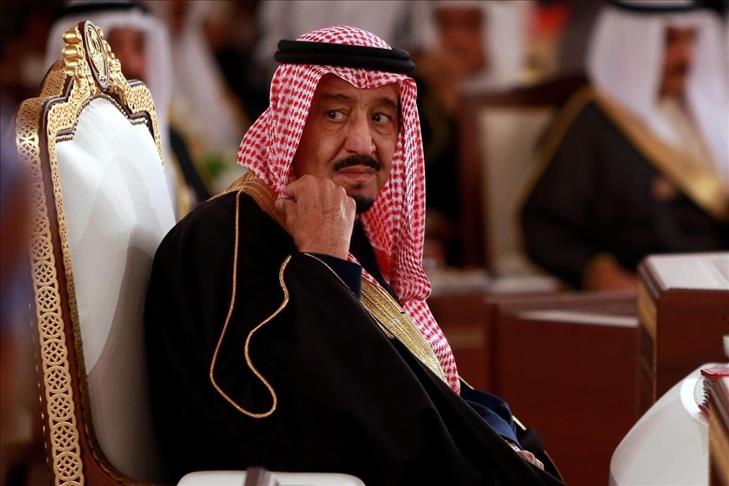
DOHA
Saudi Arabia's King Salman bin Abdel-Aziz has been in office for 100 days now, during which he had to deal swiftly with a host of serious domestic and regional challenges.
Iran has been the buzzword behind most of these challenges, especially after the Islamic, majority Shiite republic was accused of supporting the Shiite Houthi group in neighboring Yemen as well as the regime of Syrian President Bashar al-Assad, the man Saudi Arabia has been trying to bring down by supporting the armed opposition.
Yemen is another challenge for Saudi Arabia, especially after the Shiite Houthi group controlled its capital Sanaa and the country descended into an acute political and security chaos.
Other challenges for the oil-rich kingdom include the growing power of Daesh, which overran vast territories in neighboring Iraq and Syria.
Saudi Arabia's Shiite population also accuses the government of the kingdom of marginalizing them, which makes them yet another challenge for the House of Saud.
The need for speeding up political reforms in this highly conservative country also stands for an additional challenge.
The final challenge to the king is personal and this is about his age. King Salman is 79 years old now and he does not walk or move without demonstrating signs – even minor ones – of old age.
Successes
King Salman, who took over on Jan. 23, succeeded his brother, King Abdullah bin Abdulaziz, who died on the same day.
After spending 100 days on the saddle of Saudi Arabia, King Salman seems to have succeeded in ushering in a new spirit across his country.
King Salman reorganized the power pyramid in his country. He promoted two people from the second line of leadership and staged the largest cabinet reshuffle, abolishing 12 government agencies and creating two new agencies.
The man also changed the rules of Saudi Arabia's domestic and foreign policies and also the features of future rule in the Sunni powerhouse.
The king, meanwhile, issued 65 royal decrees during his 100 days in power, a number that local observers described as "unprecedented" in such short time.
Power pyramid
Hours after he came to office, King Salman issued six royal decrees that included the appointment of Prince Mohamed bin Nayef, 56, as deputy crown prince and interior minister.
He also appointed his son, Prince Mohamed bin Salman, 30, as the minister of defense, making the latter the first grandson of King Abdulaziz to occupy this position.
On Jan. 29, King Salman issued 34 royal decrees, bringing about the largest cabinet reshuffle in the history of Saudi Arabia.
Three months later, King Salman issued 25 royal decrees, relieving Crown Prince Muqrin bin Abdulaziz of his duties and appointed Prince Mohamed bin Nayef in his stead.
Another decree also appointed Mohamed bin Salman as the deputy crown prince.
The remaining decrees unveiled the new mindset ruling Saudi Arabia, according to observers.
One of these decrees banned a Saudi prince from participating in any sports activity or appearing in media after he made remarks slammed as "racist."
A Saudi soldier was, meanwhile, questioned because he threatened to kill Saudi Arabia's Shiite citizens.
Well-known Saudi opposition activist Kassab al-Uteibi was also allowed to return to Saudi Arabia after spending 20 year in exile.
A travel ban against well-known preached Salman al- Ouda was also lifted.
Nevertheless, some people fault King Salman in that he specified the top of the power pyramid in his country to Sudairis, namely the grandchildren of princess Hussa bint Ahmed Al Saudiri, one wife of King Abdulaziz Al Saud, the founder of Saudi Arabia.
These critics expressed fears that the presence of Sudairis only at the top of the pyramid will open the door for conflicts with other branches of the Al Saud family.
Foreign policy
In the seventh week of his rule, King Salman gave the go ahead signal for a military operation against Yemen's Shiite Houthi group.
The operation is led by Mohamed bin Salman, the then defense minister and the deputy crown prince now.
Saud Arabia has, meanwhile, taken steps to improve its relations with Turkey and Sudan, while preserving its relations with Egypt and even offering political and economic support for this country.
Some people believe that the anti-Houthi operation succeeded in undermining the Houthis and also sending a strong message to Iran.
The operation could not, however, totally deter the Houthis or convince them to go back to the negotiation table.
New blood
By appointing Mohamed bin Nayef and Mohamed bin Salman as crown prince and deputy crown prince respectively, King Salman managed to infuse new blood into his country's rule.
Some people say that the king cannot solve all his country's internal problems, which include the fight against terrorism, appeasing Saudi Arabia's Shiites and developing the country, within 100 days only.
Despite this, King Salman was keen to deliver important messages through these 100 days, ones that could give insight into the manner the king would address his country's problems.
On March 10, the king delivered his first televised speech, in which he was keen to underline equality among Saudi citizens, regardless of their background.
"There is no difference between one citizen and another or between one region and another," the king said in his speech.
"Saudi citizens are equal in rights and duties," he added.
At the same time, the king said that he would not tolerate any negligence on the part of any government official.
Anadolu Agency website contains only a portion of the news stories offered to subscribers in the AA News Broadcasting System (HAS), and in summarized form. Please contact us for subscription options.







